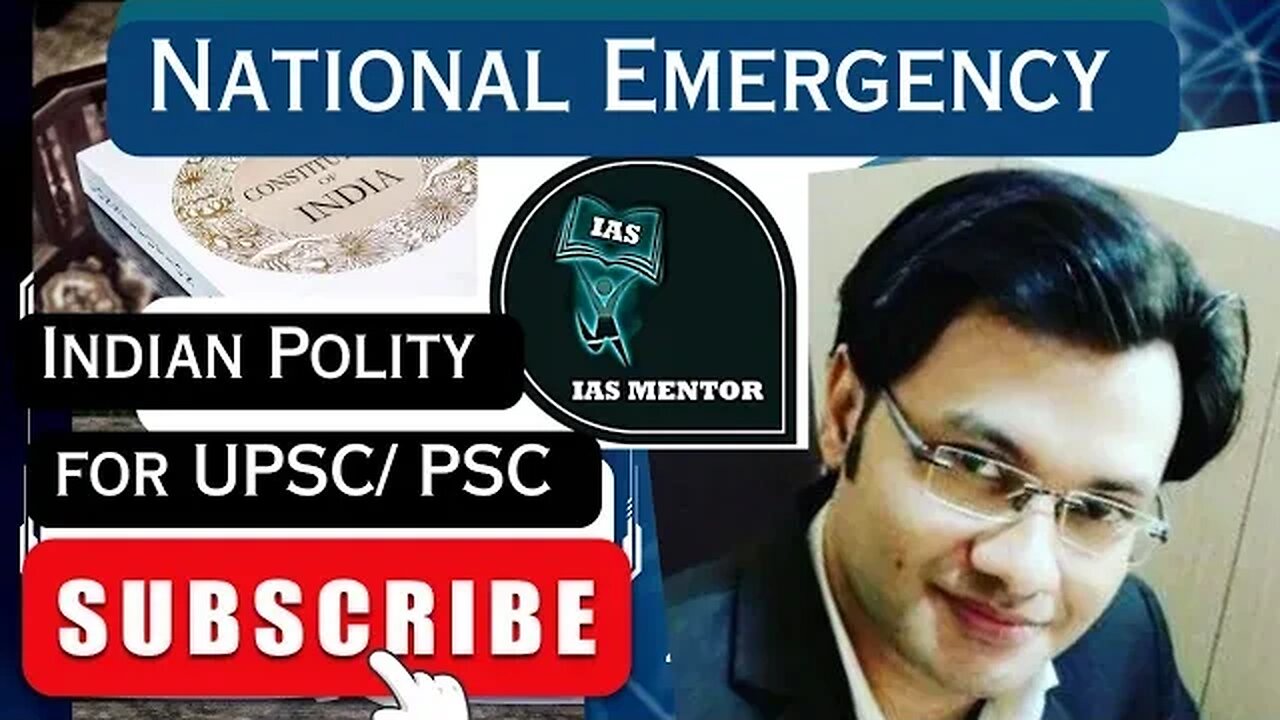Premium Only Content

National Emergency|| Emergency Provision|| Part XVIII (352-360) of ndian Constitution|| Article 352
National Emergency|| Emergency Provision|| Part XVIII (352-360) of Indian Constitution|| Article 352
#article358
#article 359
@ias_mentor
Our Social Media Links:
Facebook: https://www.facebook.com/iasmentor?mibextid=ZbWKwL
Instagram:
https://instagram.com/ias_mentor_delhi?igshid=MjEwN2IyYWYwYw==
https://instagram.com/adv.sahbanali?igshid=NGExMmI2YTkyZg==
Twitter 🐥 https://twitter.com/ias_mentor?t=xPhUSPe6v9thMhOrZqCbaQ&s=09
"National Emergency in India | Understanding Indian Polity for UPSC"
Description:
Welcome to our comprehensive video on "National Emergency in India," where we delve into the intricacies of this crucial topic from the Indian polity, tailored specifically for UPSC aspirants.
In this video, we provide a detailed exploration of the constitutional provision of a National Emergency in India, as outlined in Article 352 of the Indian Constitution. Our expert panel of educators breaks down the concept, its triggers, and the implications it has on the functioning of the country.
Throughout the video, we cover the following key aspects:
1. Introduction to National Emergency: Gain a fundamental understanding of the concept, its purpose, and the circumstances that warrant its declaration in India.
2. Constitutional Provisions: Explore Article 352 of the Indian Constitution, including the President's role, the advice of the Council of Ministers, and the duration and extension of the emergency.
3. Triggers and Types: Examine the different situations that may lead to the declaration of a National Emergency, such as war, armed rebellion, or external aggression. Understand the distinctions between the three types of emergencies.
4. Implications and Effects: Discover the wide-ranging consequences of a National Emergency on various aspects of governance, fundamental rights, federalism, and the functioning of the executive, legislature, and judiciary.
5. Suspension of Fundamental Rights: Dive into the specific fundamental rights that can be suspended during a National Emergency, their implications, and the scope of judicial review.
6. Case Studies: Analyze past instances when a National Emergency was declared in India, including the Emergency of 1975, and examine the lessons learned from those events.
7. Review of Recent Developments: Stay updated with the latest developments related to the National Emergency provision in India, including any amendments or significant legal judgments.
By the end of this video, you will have gained a comprehensive understanding of the National Emergency provision in the Indian polity, equipping you with the knowledge and insights necessary to tackle UPSC examinations with confidence.
Subscribe to our channel and hit the notification bell to never miss an update on essential topics like this. Don't forget to like and share this video with fellow UPSC aspirants who seek in-depth knowledge of Indian polity and its constitutional nuances.
Prepare yourself for success in your UPSC journey with our trusted educational resources. Stay tuned, and let's begin our exploration of the National Emergency in India!
-
 1:03:45
1:03:45
Donald Trump Jr.
14 hours agoHappy Festivus: Airing Our Grievances and Stopping The Swamp w/Sean Davis | TRIGGERED Ep.201
231K217 -
 1:58:10
1:58:10
Robert Gouveia
12 hours agoMatt Gaetz REJECTS Report, Sues Committee; Luigi Fan Club Arrives; Biden Commutes; Festivus Waste
143K102 -
 58:10
58:10
Kimberly Guilfoyle
14 hours agoAmerica is Back & The Future is Bright: A Year in Review | Ep. 183
87.6K56 -
 3:03:27
3:03:27
vivafrei
19 hours agoEp. 242: Barnes is BACK AGAIN! Trump, Fani, J6, RFK, Chip Roy, USS Liberty AND MORE! Viva & Barnes
161K189 -
 8:09:50
8:09:50
Dr Disrespect
17 hours ago🔴LIVE - DR DISRESPECT - MARVEL RIVALS - GOLD VANGUARD
202K33 -
 1:15:00
1:15:00
Awaken With JP
16 hours agoMerry Christmas NOT Happy Holidays! Special - LIES Ep 71
228K190 -
 1:42:21
1:42:21
The Quartering
17 hours agoTrump To INVADE Mexico, Take Back Panama Canal Too! NYC Human Torch & Matt Gaetz Report Drops!
172K110 -
 2:23:15
2:23:15
Nerdrotic
17 hours ago $14.19 earnedA Very Merry Christmas | FNT Square Up - Nerdrotic Nooner 453
129K12 -
 1:14:05
1:14:05
Tucker Carlson
17 hours ago“I’ll Win With or Without You,” Teamsters Union President Reveals Kamala Harris’s Famous Last Words
228K378 -
 1:58:31
1:58:31
The Dilley Show
17 hours ago $36.58 earnedTrump Conquering Western Hemisphere? w/Author Brenden Dilley 12/23/2024
170K50